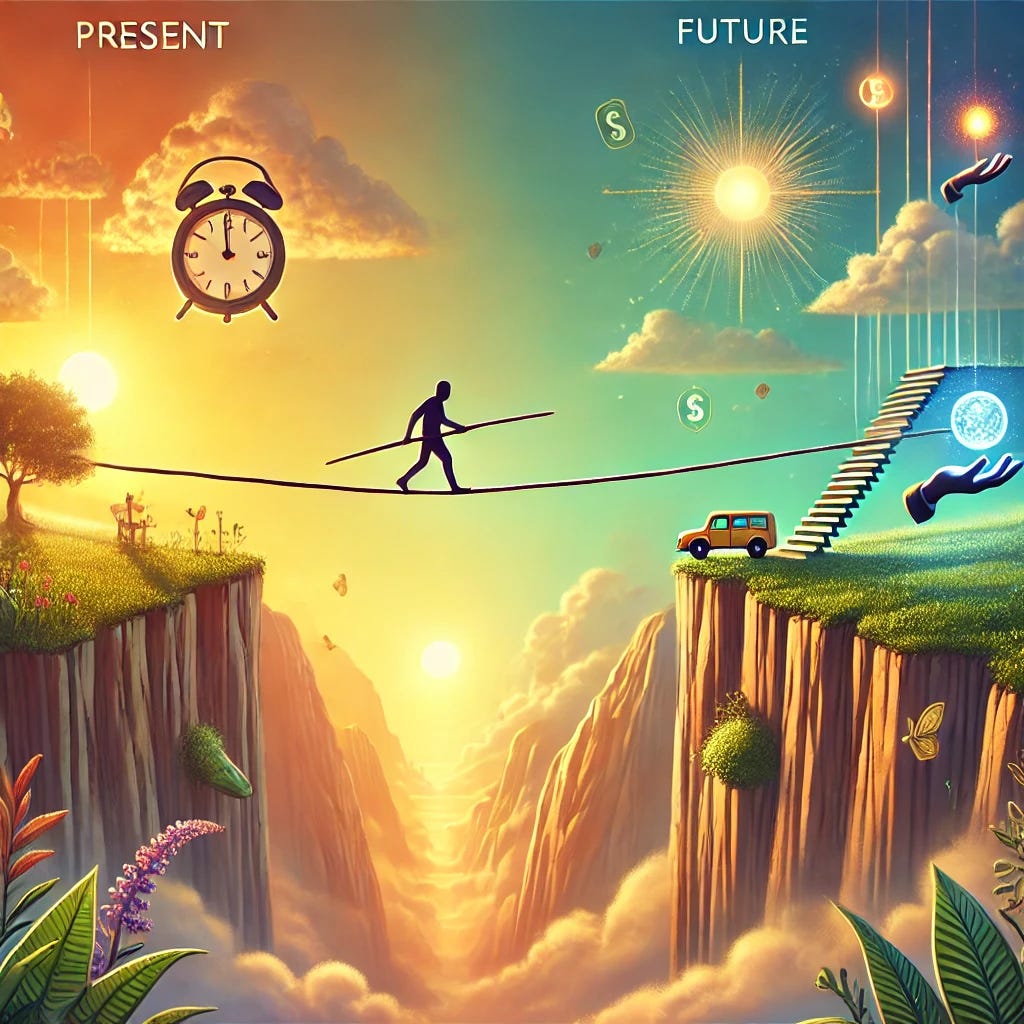Illusions of Tomorrow
How grandeurs of the future rob us of our present happiness
Mind Candy is a newsletter on practical philosophy and human flourishment—aka how to live “the good life.” Each month we tackle a new theme.
This month we’re exploring the theme of happiness and flourishment.
One of the key characteristics that we use to limit our own happiness is always looking towards the future.
We’re naturally inclined to look ahead. From an evolutionary perspective, we needed to always be thinking of where our next meal was coming from, when our next enemy might strike, what the next day would hold.
But much of this has been diminished by modern day living and our needs being met. We can buy food at the grocery stores and we have security for our homes and families.
But keeping an eye on the future hasn’t changed, we’ve just adjusted how we think about it. While the mindset of our ancestors was survival, because we’ve met all of our survival needs, our concerns turn to happiness.
Happiness, however, is wasted on those who are always looking toward tomorrow.
Sometimes we’re very limited in our ability to be present because the future, in our mind, holds so much more potential since it is unwritten.
We build narratives around these beliefs and tie them to our happiness.
If I buy a Mercedes and trade in my Ford, I’ll be happy;
If I get the promotion at work, I can slow down again and spend time with my family which is ultimately what I want;
Once I have X amount of money in the bank, I can feel relaxed and happy.
The problem is we make all these signals up. We’re the ones writing the stories that these things will fulfill us.
According to renowned psychologist Daniel Gilbert, we’re the ones “constructing tomorrows that we hope will make them [us] happy.”
For so much of human existence, happiness was never a consideration. But because our basic needs are met, our mind builds reasons and creates “goals” that we want which we believe will bring us happiness.
But these narratives remove us from the present moment, which is technically the only thing that exists. The future has yet to be born. And so we push ourselves for these future goals but by doing so ignore our present existence and the experience of actually just living in the moment and experiencing everything it has to offer.
“The greatest achievement of the human brain,” writes Gilbert, “is its ability to imagine objects and episodes that do not exist in the realm of the real, and it is this ability that allows us to think about the future.”
We’re naturally inclined to this future happiness projection because we’re technically mental time travelers, holding the ability to imagine future scenarios that may come about.
Thinking about the future is good. It allows us to imagine and prepare. We need the ability to imagine what tomorrow might bring, to run through scenarios in our mind, to practice conversations and plan accordingly. But when we put too much stock in the future, when these preparations keep our mindset out of the present, we risk missing true happiness which lives in the now.
We need to keep two feet on the ground in the present with an eye to the future.
“To see is to experience the world as it is, to remember is to experience the world as it was, but to imagine--ah, to imagine is to experience the world as it isn't and has never been, but as it might be” writes Gilbert.
The author Suzy Welch has an exercise that assists in aligning our future selves to our present selves through a single question known as 10-10-10.
“Every 10-10-10 process starts with a question. [W]hat are the consequences of each of my options in ten minutes? In ten months? In ten years?"
By forcing us to look to three different periods of time, we realign ourselves to the present. When we think too far ahead, we lose control as too many variables can throw off future goals or decisions. But by reorienting the future to our latest 10-10-10 exercise, we’re forced to constantly adjust to the present moment and recalibrate the future.
Remember, the future is unwritten and dependent upon our present moment. In order to properly align our future, we must first focus on the situations and experiences we’re in currently.
“Life is short. That's all there is to say. Get what you can from the present - thoughtfully, justly. Unrestrained moderation,” Marcus Aurelius reminded himself.
Carpe diem.
Before you go…
If you enjoyed the above article, you may be interested in this to continue your exploration:
Thank you for reading Mind Candy. If you enjoyed this work, please consider upgrading to a paid subscription. Or if now isn’t the right time, please share to someone who could benefit.
Until next time,
D.A. DiGerolamo
We are a participant in the Amazon Services LLC Associates Program, an affiliate advertising program designed to provide a means for sites to earn advertising fees by advertising and linking to Amazon.com.









